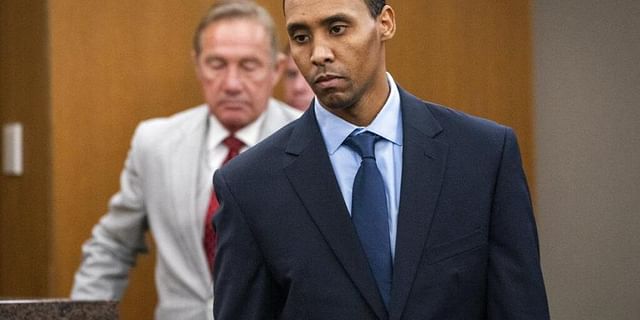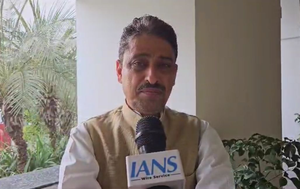 MINNEAPOLIS: A former Minneapolis police officer who fatally shot an unarmed woman after she called 911 to report a possible rape behind her home was sentenced Thursday to 57 months on a lesser charge after his murder conviction was overturned.
MINNEAPOLIS: A former Minneapolis police officer who fatally shot an unarmed woman after she called 911 to report a possible rape behind her home was sentenced Thursday to 57 months on a lesser charge after his murder conviction was overturned.
Mohamed Noor was initially convicted of third-degree murder and manslaughter in the July 2017 fatal shooting of Justine Ruszczyk Damond, a 40-year-old dual U.S.-Australian citizen and yoga teacher who was engaged to be married. He was sentenced to 12 1/2 years on the murder count, but last month, the Supreme Court tossed out Noor’s murder conviction and ordered him to be resentenced for manslaughter.
The sentence announced by Judge Kathryn Quaintance was the maximum allowed under the state’s sentencing guidelines, which call for a range of 41 to 57 months. Noor had sought the shortest possible term.
In Minnesota, defendants with good behavior typically serve two-thirds of their sentence in prison, and the rest on supervised release.
The justices said the charge can only apply when a defendant shows a “generalized indifference to human life,” not when the conduct is directed at a particular person, as it was with Damond.
Experts say the ruling means the third-degree murder conviction earlier this year against former Minneapolis police officer Derek Chauvin in George Floyd’s 2020 death likely also will be tossed out. But that would have little impact because Chauvin was also convicted of a more serious second-degree murder charge in Floyd’s death. Chauvin was sentenced to 22 1/2 years.
Noor testified at his 2019 trial that he and his partner were driving slowly in an alley when a loud bang on their police SUV made him fear for their lives. He said he saw a woman appear at the partner’s driver’s side window and raise her right arm before he fired a shot from the passenger seat to stop what he thought was a threat.
He was sentenced to 12 1/2 years on the murder count and had been serving most of his time at an out-of-state facility. Noor will be resentenced for his second-degree manslaughter conviction, with state guidelines calling for a range of 41 to 57 months and a presumptive sentence of four years.
His attorneys, Tom Plunkett and Peter Wold, have asked for 41 months, citing Noor’s good behavior behind bars and harsh conditions he faced during many months in solitary, away from the general prison population.
In arguing for the shortest possible sentence during Thursday’s hearing, Plunkett said much attention has been given to the victim as a kind and giving person — “all true,” he said. But Plunkett said there is “similar goodness” in Noor. He said Noor had always sought to help people around him, and recapped Noor’s good behavior while in prison.
Assistant Hennepin County Attorney Amy Sweasy, meanwhile, asked Quaintance to give Noor the longest possible sentence, 57 months. She said the case “is worse than typical” because of who Noor is. “The most serious sentence this court can impose is required,” she said.
Damond’s parents, John Ruszczyk and Maryan Heffernan, also asked the judge to impose the longest sentence. In a statement read by prosecutors, they called Damond’s death “utterly gratuitous” and said that the Minnesota Supreme Court’s overturning of a “poorly written law” didn’t change the jury’s belief that Noor committed murder.
“Our sorrow is forever, our lives will always endure an emptiness,” they said.
The victim’s fiancé, Don Damond, gave his statement via Zoom. He started by praising prosecutors for their “sound application of the law” and criticizing the state Supreme Court for its reversal, which he said “does not diminish the truth that was uncovered during the trial.”
““The truth is Justine should be alive. No amount of justification, embellishment, cover-up, dishonesty or politics will ever change that truth,” he said.
But Don Damond also spoke directly to Noor, saying he forgave him and had no doubt Justine also would have forgiven him “for your inability in managing your emotions that night.”
Noor, wearing a suit and tie and donning a face mask, appeared impassive as the victim’s loved ones’ statements were read. He later addressed the court briefly, saying, “I’m deply grateful for Mr. Damond’s forgiveness. I will take his advice and be a unifier. Thank you.”
Noor, who was fired after he was charged, has already served more than 29 months. In Minnesota, inmates who behave well typically serve two-thirds of their prison sentences and the remainder on supervised release. If Noor gets the presumptive four years, he could be eligible for supervised release around the end of this year.
If the judge sentences Noor to 41 months, he could be eligible for supervised release — commonly known as parole — right away, though in such situations defendants are typically briefly returned to prison to work out logistics of the parole.
Noor can make a statement at Thursday’s hearing. At his original sentencing in 2019, he got emotional as he expressed regret for what he had done and apologized to Damond’s family.
Damond’s family members came from Australia for the 2019 trial, but they were expected to have statements read on their behalf Thursday.
Damond’s death angered citizens in the U.S. and Australia, and led to the resignation of Minneapolis’ police chief. It also led the department to change its policy on body cameras; Noor and his partner didn’t have theirs activated when they were investigating Damond’s 911 call.
Noor, who is Somali American, was believed to be the first Minnesota officer convicted of murder for an on-duty shooting. Activists who had long called for officers to be held accountable for the deadly use of force applauded the murder conviction but lamented that it came in a case in which the officer is Black and his victim was white. Some questioned whether the case was treated the same as police shootings involving Black victims.
Days after Noor’s conviction, Minneapolis agreed to pay $20 million to Damond’s family, believed at the time to be the largest settlement stemming from police violence in Minnesota. It was surpassed earlier this year when Minneapolis agreed to a $27 million settlement in Floyd’s death just as Chauvin was going on trial.
Recent Random Post:















